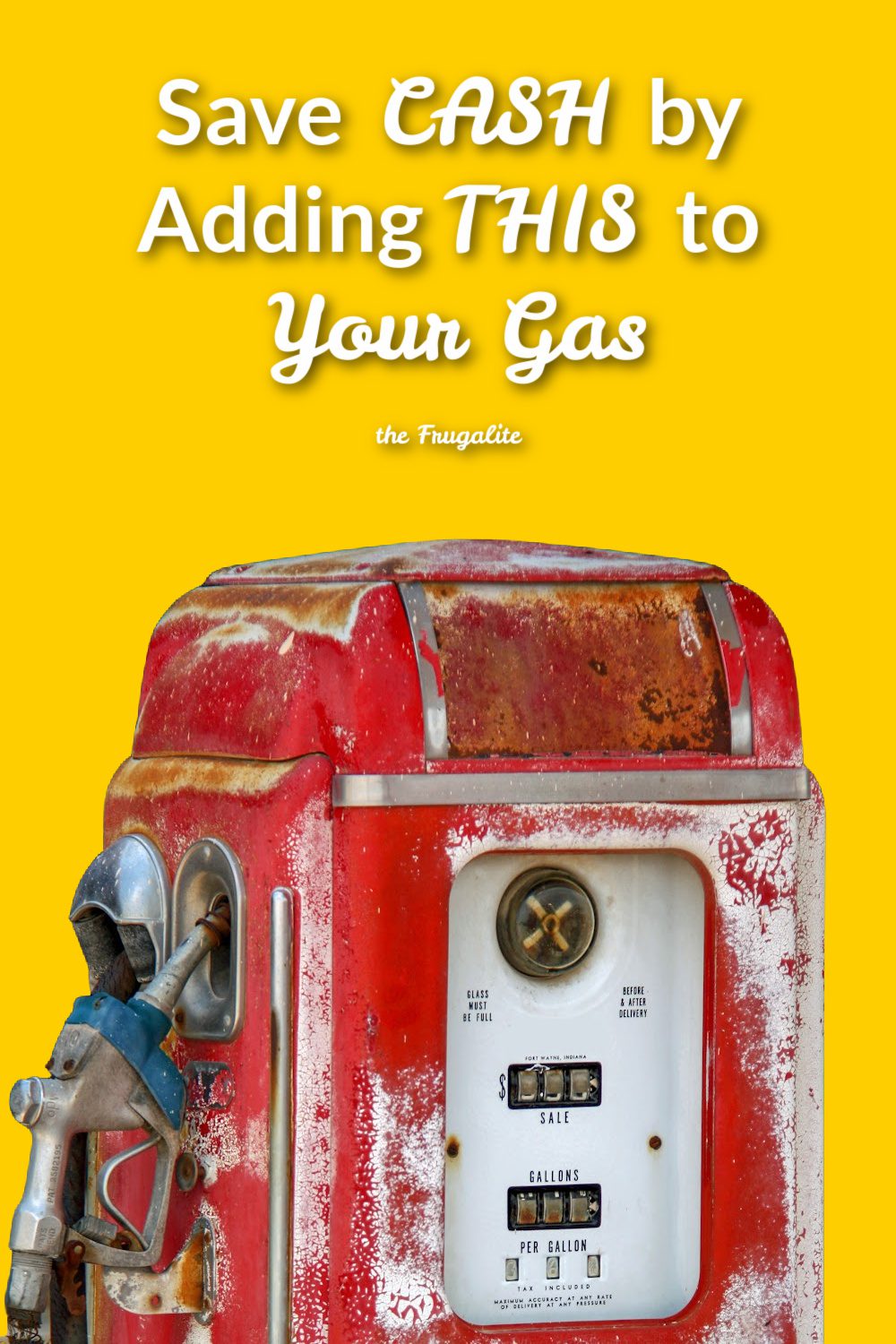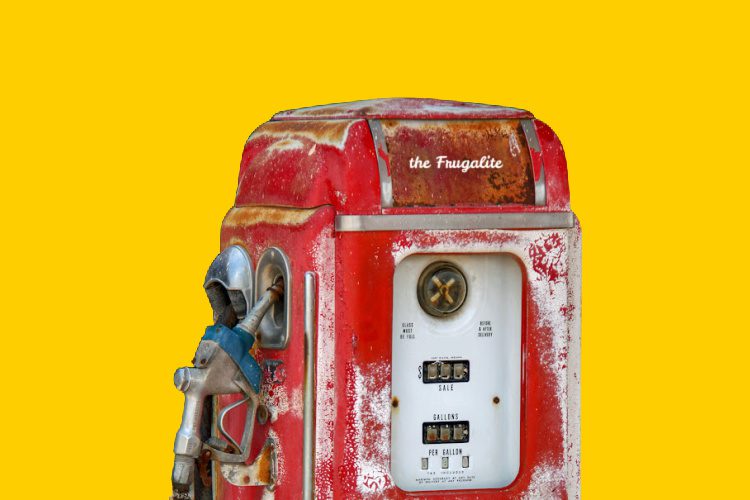(Psst: The FTC wants me to remind you that this website contains affiliate links. That means if you make a purchase from a link you click on, I might receive a small commission. This does not increase the price you’ll pay for that item nor does it decrease the awesomeness of the item. ~ Daisy)
Want to save money on gas? For many years, I have driven compact cars. In general, this size car is pretty easy on gas. In addition, I have carefully selected all my “beaters,” which saved me money on the price, too.
Fortunately, a car-handy friend gave me a great tip one day. He had a “secret sauce” he added to his gas tank that improved mileage. Save even MORE money on gas??? This Frugalite was interested. In this article, I’m going to tell you all about my “secret gas-saving sauce.”
What are fuel injector cleaners?
Fuel injector cleaners are chemicals that you add to your fuel tank. While some people call them detergents, others call them solvents. These cleaners dissolve some of the buildup within your injectors and other parts of your fuel line. [source]
Using these cleaners is helpful and can keep your engine running efficiently. Adding a fuel injector cleaner to your gasoline could reduce issues, including a rough idle or overly loud engine noise. Adding a fuel injector cleaner can also improve overall engine performance and mileage. [source]
There is no replacement for good maintenance
Like many things, your vehicle will work best when it is well maintained. So, adding a chemical like fuel injector cleaner to your fuel will not be able to clean significant blockages or heavy buildup in your fuel line. To maintain your fuel lines, use the best fuel you can afford to buy. Do your research about what fuel you put in your vehicle and find out if it already includes some fuel injector cleaner chemicals, as some top-tier gasoline producers in some states add cleaners to the fuel. [source]
Save more money on gas using these tips
Fuel injector cleaners offered many benefits when I drove Rosie. However, I found some Frugalite ways to save even further.
- I bought the large volume jug, rather than smaller bottles. The savings of doing this alone is substantial. In Canada, one common brand is $CA16.99 ($13.25) for 1L or $CA46.99 ($36.65) for 4L. That is a savings of $CA20.97 ($16.36) for buying in bulk, more than a 1L bottle!
- Even the large jugs go on sale. One large jug will last me months and months, so I have lots of time to check the flyers and get them on sale. I could usually get my favorite brand for under $CA40.00 ($31.20) by waiting for a deal.
- One of our hardware stores has its own store brand of fuel injector cleaner sold in a 4L bottle. This is $39.99 ($31.19), so an additional savings of $CA7.00 ($5.46) over 4L. I have to admit I never tried that brand. I stuck with the brand that my friend had recommended.
My bottom line
I tracked the mileage I got from a tank of gas with Rosie many, many times. Her tank was 50L (13.25 Gallons), and I was averaging around 400km per tank. This meant that I was paying about $CA10 ($7.80) to drive 100km. When I added the fuel injector cleaner to her tank as directed, I got more mileage, around 440km per tank. That is 110% of what I would usually get (this was mostly highway driving, by the way).
When I considered that I could buy the huge jug for only $CA40 ($31.20), and it would last me even up to a year, I found this to be a decent investment.
Would every vehicle benefit in the same way?
I think this is unlikely. Perhaps Rosie’s age had something to do with the benefits I was getting. I was not using high-priced gas, just the regular stuff. With a 20-year-old car, I didn’t think that the investment in more expensive gas was worth it. Although Rosie ran pretty smoothly, I wonder if the fuel injector cleaner just helped prevent further buildup and perhaps removed some of the finer deposits in her fuel system.
Those of you who have been reading The Frugalite for some time may be wondering if I am using fuel injector cleaners in my new car, Lucky. Dear Readers, I am not, as I have not had a chance to ask my trusted mechanic if it will be good for Lucky, who is much newer and has a different manufacturer than Rosie. In addition, I have been quite surprised at how much better Lucky’s mileage is than Rosie’s (sorry, Rosie, RIP!).
Here are the numbers: with the gas additive, I was getting 440km from Rosie for a tank of gas (about 50L, or 13.25 Gallons). I am getting over 625km for a similar-sized gas tank for Lucky without the gas additive. I feel this difference is likely due to improved technology over the 20 years since Rosie was built.
My mechanic will have to let me know if I should add anything to Lucky’s tank to improve mileage. I will keep everyone posted on what my mechanic says on this topic, as I am almost due for Lucky’s first oil change. The changeover to winter tires is also looming….yikes!
Fuel injector cleaner controversy
I would be remiss if I didn’t also highlight some controversy regarding the use of fuel injector cleaners. Some critics are cautious in the absence of what they feel is “hard data” on their use: “Those little bottles might help to clean out your fuel injectors and fuel system. Then again, they might not.” [source] Others admit there is “some confusion and uncertainty in the market” but encourage consumers to test it for themselves:
“The good news is that injector cleaners are inexpensive, so it won’t hurt to at least try a bottle in your fuel mix when you are experiencing problems. If you’re still experiencing symptoms of faulty injectors, you can visit a trusted auto repair shop to have a full diagnosis performed to get your vehicle back into peak condition.” [source]
Would you step on the gas to save money on gas?
Do you use any fuel additives to save money? Why or why not? Is there another similar product that you would recommend that improves your gas mileage or your vehicle’s performance? Please share your thoughts in the comments section below.












16 thoughts on “Save Money on Gas by Adding THIS”
No comment for now.
Hi Philemon, that’s totally fine! Please let us know if you have a chance to try a fuel injector cleaner and how it works for you.
At the moment I buy all my gas at Chevron because I notice their Techron really does make a difference and helps my car run better. Before that I’d use fuel injector cleaner. My vehicle is a 2006 sedan and has a ton of miles on her, and I can immediately tell the difference when I use a good cleaner. She runs more smoothly and after a bit of driving I have better engine performance.
Aha! Redbranch! It was actually the Techron at Chevron that I had read was quite effective. Thank you for posting your experience with it. That is reinforcing my feeling that these older vehicles see a real benefit from the fuel injector cleaners. So appreciate your thoughts on this. Many thanks!
Can you say ‘mailing list’?
Think about it.
Add my name if you ever get around to it.
Thanks.
Hi BMP, I’m assuming you’re talking about The Frugalite. I have a message in to admin about this. Thanks very much!
I add a small bottle of fuel injector cleaner to the tank of my car once every 4,000 miles, and one to my wife’s car every six months. The bottle is six ounces. I don’t buy it in bulk because there are a lot of volatiles in the cleaner.
If you buy a large bottle, open it, and it takes a year to use it, a lot of the chemicals lose their strength. If you can, find smaller bottles on sale (or order through Amazon) and use the bottle in a few months.
My 2013 Altima has 140,000 miles on it and averages 31mpg. My driving is half highway (60-85mph) and city (25-45mph with lots of stopping).
EDIT: I buy gas at Costco. Nearly all gasoline is the same except for the additives added by the distributor.
Hi Bill, Thanks for your thoughts on this. You also have some data to support it about your Altima. It sounds to me like you’re doing well with it, especially with HALF your driving in city! If I start using the additive again in my newer car, I’ll compare my old stuff to a new bottle. This is something I had not considered. Appreciate your sharing your knowledge on this for everyone’s benefit!
Not really any data. I could take a pic of my dashboard MPG gauge? Most days I drop off my kids at school, take crowded major thoroughfares to highways, and then take the highways to work.
Hi Bill, my apologies! What I meant to express was that your MPG in your Altima seemed quite good and that does seem to provide some solid support for adding the fuel injector cleaner. Thanks for sharing your experience. It’s been quite helpful hearing from reader like you about what they do.
There are any number of articles on “Top Tier” gasoline. Here is one, by Consumer Reports:
https://www.consumerreports.org/car-maintenance/study-shows-top-tier-gasoline-worth-extra-price/
The major brands are “Top Tier” here in the US. Not sure about Canada. We have a Costco nearby where we get their “Top Tier” gas. It really makes a power and MPG difference in my wife’s V8 Explorer, my son’s V8 F-150 and my (otherwise anemic) 4-Runner.
Good luck!
Marc
Hi Marc M, I read this report from start to finish and also just watched the supplementary video. FANTASTIC! Thank you so much for posting this for everyone. I learned a lot from the article and video. I had not realized that ALL octane levels have the same amount of detergents in Top Tier gasolines. Thank you for sharing.
My pleasure to share. The article from Consumer Reports is factual and objective. I can trust their evaluations (especially since they don’t accept advertising). At our local Costco we are paying less for their 87 octane, than what we’d pay for no-name-brand gas at the c-stores.
I had a 2003 Ford a Focus that I bought as a 2 year old used car. I added a fuel injector cleaner 4 times a year. I did add some to the miIeage.
I’m going to try it with my 2003 crew cab 4×4 pickup. It doesn’t get great mileage so some difference will be measurable.
Hi Clergylady, This is great to hear that you had a similar experience to mine with your Ford Focus. I am looking forward to hearing how it goes with your 2003 crew cab. Here’s hoping it’s great for your mileage!